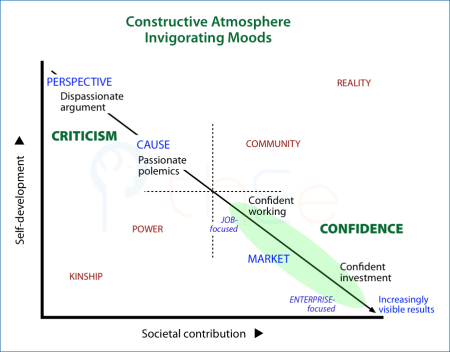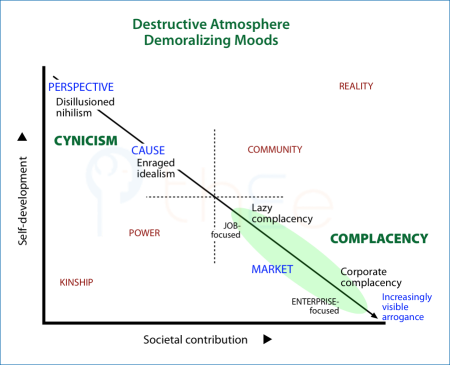Mental States 2: Dynamic Action
Moods & Their Impact

The three productivity-orientedmentalities activate personal moods and social atmospheres, which affect energy levels and personal involvement with specific decisions and useful activities:
- Constructive moods invigorate, energize and sharpen the mind
- Destructive moods demoralize, de-motivate and dull the mind.
The impact for Cause-centred & Perspective-centred (upper-left quadrant) falls on society, while the impact for Market-centred (lower-right quadrant) falls on individuals.
It can be a thin line between criticism (positive) and cynicism (negative), & between confidence (positive) and complacency (negative).
Constructive Moods: Invigoration
Moving down the diagonal, the positive mood produces increasingly visible results.
 Criticism Invigorates Society
Criticism Invigorates Society

-
Perspective-centred individuals thrive in an atmosphere of unfettered criticism and rational, precise argument. Any and every matter (even or especially «sacred cows») is dispassionately subjected to scrutiny.
Social impact occurs by responding to invitations to think the unthinkable, and by participating in inquiries in an unbiased, non-antagonistic and fair way.
responding to invitations to think the unthinkable, and by participating in inquiries in an unbiased, non-antagonistic and fair way.
-
Cause-centred individuals need to become passionately engaged with society. This requires criticism of the status quo in media polemics, pamphleteering, public demonstrations, open debates, campaigns and crusades.
Social impact occurs by vigorous controversy that is conducted in a way that generates public interest and support.
vigorous controversy that is conducted in a way that generates public interest and support.
 Confidence Invigorates Individuals
Confidence Invigorates Individuals
- Market-centred individuals are inherently optimistic but they have to feel confident to function well. Confidence enables self-reliance, reliability, integrity, and bouncing back from setbacks.
Confidence rubs off on people and is enhanced by active maintenance of networks.
-
Job-focused individuals require a confident approach to find a job or seek promotion.
Confidence fosters desirable traits like courtesy, helpfulness, following instructions, accepting change, showing initiative, and being innovative.
desirable traits like courtesy, helpfulness, following instructions, accepting change, showing initiative, and being innovative.
-
Enterprise-focused individuals need confidence to invest effectively.
Confidence sustains financially risky situations, helps in riding out troubles, enthuses followers and fellow investors, and allows fresh starts with renewed determination.
financially risky situations, helps in riding out troubles, enthuses followers and fellow investors, and allows fresh starts with renewed determination.
Destructive Moods: Demoralisation
Moving down the diagonal, the negative mood produces increasingly visible arrogance.
 Cynicism Demoralises Society
Cynicism Demoralises Society
-
Perspective-centred individuals can find disillusionment setting in. They note the self-centredness, biased thinking and unreflective attitudes of many in politics and in business, and use it as an excuse for cynicism.
At intellectual extremes the result is a philosophy of nihilism, in which positive efforts to deal with social problems are discounted as futile.
the result is a philosophy of nihilism, in which positive efforts to deal with social problems are discounted as futile.
-
Cause-centred individuals may fail to see that «the best is the enemy of the good». Feeling that their ideals and efforts are being ignored, they become frustrated and even enraged.
At fundamentalist extremes personal commitment becomes paradoxical and violent: the adherent kills to promote life; or tortures to show compassion.
personal commitment becomes paradoxical and violent: the adherent kills to promote life; or tortures to show compassion.
 Complacency Demoralises Individuals
Complacency Demoralises Individuals
- Market-centred individuals can become complacent, self-satisfied and disconnected from co-workers and customers, because of their own success. They then fail to see the dangers ahead.
-
Job-focused individuals who become complacent, present themselves as lazy, smug and insensitive. They do not strive to produce or serve the market, and are liable to alienate bosses, subordinates, suppliers and customers alike.
Complacency is a natural precursor to losing your job.
losing your job.
-
Enterprise-focused individuals are prone to become arrogant and generate corporate complacency. The complacent company rests on its laurels, lets debt accumulate, allows competitors to take its best customers, takes community support for granted, ignores complaints and product failures, refuses to heed warnings or seize opportunities, and pays its top executives phenomenal salaries.
Complacency is a natural precursor to collapse of the company into either bankruptcy or a competitor’s embrace.
collapse of the company into either bankruptcy or a competitor’s embrace.
Originally posted: July 2009


![]() Confidence Invigorates Individuals
Confidence Invigorates Individuals
![]() Complacency Demoralises Individuals
Complacency Demoralises Individuals